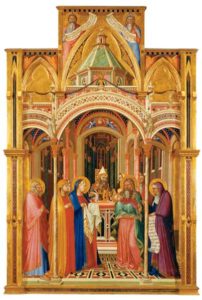
The Presentation in the Temple
Ambrogio Lorenzetti, 1342
Luke 2:33-40
Jesus’ mother and father were full of wonder at what was being said about him. Simeon blessed them and said to Mary his mother, “This child is destined to be a sign which people reject; and you too shall be pierced to the heart. Many in Israel will stand or fall because of him, and thus the secret thoughts of many will be laid bare.”
There was a prophet, Anna the daughter of Phanuel, of the tribe of Asher. She was a very old woman, who had lived seven years with her husband after she was first married, and then alone as a widow to the age of eighty-four. She never left the Temple, but worshiped day and night, fasting and praying. Coming up at that very moment, she returned thanks to God; and she talked about the child to all who were looking for the liberation of Jerusalem.
Prophet: Who could be a prophet? *
Thoughts: on being poor — Donna Ross
Now Luke brings us another prophet, this time an old woman.
Eighty-four years is a long time to live, even today; in those days, to live so many years was almost a miracle. Yet there would be no birthday celebration for Anna, or for women like her — they were all alone. Without family — without sons — a widow had no income, nothing to live on.
There was no one in Israel less important than a childless widow, despite the constant teaching of the Law from Moses on down through the years. Yet Luke calls Anna a prophet, one who voices the Word of God.
If we pay very close attention to Luke, we will notice that his story includes many women; in fact, almost every story about a man is followed by a story about a woman. Is Luke saying that women have always been as important in Jesus’ story as men?
* Prophets
In the previous reading, Luke doesn’t call Simeon a prophet, but describes him as “upright and devout… and the Holy Spirit was upon him…. It had been disclosed to him by the Holy Spirit that he would not see death until he had seen the Lord’s Messiah. Guided by the Spirit he came into the temple…” In this reading, Luke uses the word prophet to describe Anna, who is equally upright and devout, who is equally guided by the Holy Spirit. In this Gospel, the Holy Spirit falls upon men and women equally, and stories about men are balanced by stories about women.
